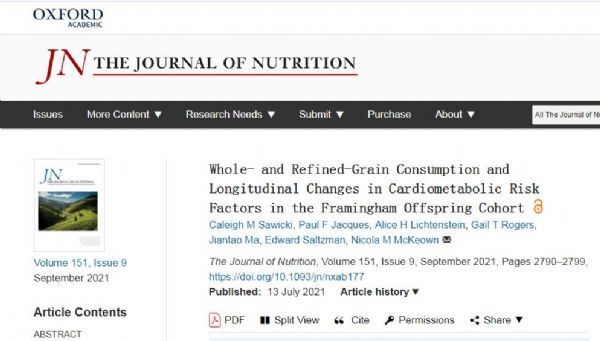Nutrition: The intake of whole grains may reduce the risk of heart disease
- Aspirin: Study Finds Greater Benefits for These Colorectal Cancer Patients
- Cancer Can Occur Without Genetic Mutations?
- Statins Lower Blood Lipids: How Long is a Course?
- Warning: Smartwatch Blood Sugar Measurement Deemed Dangerous
- Mifepristone: A Safe and Effective Abortion Option Amidst Controversy
- Asbestos Detected in Buildings Damaged in Ukraine: Analyzed by Japanese Company
Nutrition: The intake of whole grains may reduce the risk of heart disease
- Red Yeast Rice Scare Grips Japan: Over 114 Hospitalized and 5 Deaths
- Long COVID Brain Fog: Blood-Brain Barrier Damage and Persistent Inflammation
- FDA has mandated a top-level black box warning for all marketed CAR-T therapies
- Can people with high blood pressure eat peanuts?
- What is the difference between dopamine and dobutamine?
- How long can the patient live after heart stent surgery?
The Journal of Nutrition: The intake of whole grains may reduce the risk of heart disease
Scientists from Tufts University and other institutions have found through research that, compared with the intake of refined grains, large intake of whole grains may be related to a slight increase in waist size, blood pressure and blood sugar levels.
Consuming more whole grains (WG, whole grain) may be directly related to the risk of cardiovascular disease. However, there are few prospective studies that analyze the relationship between the intake of whole grains or refined grains and moderate cardiometabolic risk factors ’S association.
Recently, a research report entitled “Whole- and Refined-Grain Consumption and Longitudinal Changes in Cardiometabolic Risk Factors in the Framingham Offspring Cohort” was published in the international journal The Journal of Nutrition.
Scientists from Tufts University and other institutions Through research, we found that, compared with the intake of refined grains, large intake of whole grains may be related to a slight increase in waist size, blood pressure, and blood sugar levels.
Researcher Dr. Caleigh M. Sawicki said that we tracked 3121 participants from the Framingham Offspring Cohort Study Program (Median Tracking, 18 years), and analyzed the consumption of whole grains and refined grains to the participants. Correlation between waist circumference (WC), fasting high-density lipoprotein (HDL) cholesterol, triglyceride and glucose concentrations, and blood pressure.
The results of the study showed that high intake of whole grains may be directly related to the participants’ small increase in waist circumference, fasting blood glucose concentration, and systolic blood pressure every four years. Compared with men, the waist circumference of female participants was similar to that of whole grains.
The relationship between intake is closer; there is a trend that large intake of whole grains may be directly related to the increase in the body’s high-density lipoprotein level and the decrease in the triglyceride concentration, but when the changes in the waist circumference of the participants are adjusted Later, these differences may become less significant; the researchers pointed out that the intake of more refined grains may be related to the participants’ significant increase in waist circumference and a slight decrease in triglyceride concentration.

Image source: https://academic.oup.com/jn/article/151/9/2790/6311830
To sum up, in the middle-aged and elderly people, using whole grains instead of refined food may be an effective way to modify the diet to reduce the body’s abdominal fat, dyslipidemia and high blood sugar over time, thereby helping to reduce The risk of cardiometabolic diseases in the body.
(source:internet, reference only)
Disclaimer of medicaltrend.org
Important Note: The information provided is for informational purposes only and should not be considered as medical advice.



